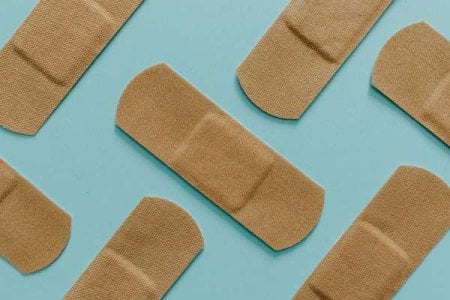Shocking report reveals dangerous chemicals in first-aid staple
By
Danielle F.
- Replies 5
When we reach for a Band-Aid, it's with the trust that we're protecting ourselves or our loved ones from the risks of an open wound.
However, a recent investigation has raised alarming concerns about the safety of these seemingly innocuous first-aid staples.
A shocking report has revealed that many bandages contain 'forever chemicals' that could pose a cancer risk when they come into direct contact with our blood through open wounds.
The term 'forever chemicals' refers to per-and polyfluoroalkyl substances (PFAS), which are man-made chemicals notorious for their persistence in the environment and in human bodies.
These chemicals are used in a wide range of consumer products for their water and grease-resistant properties.
PFAS are more common than we might think, with their presence in nonstick cookware, stain-resistant carpets and firefighting foams.
However, what makes the presence of PFAS in bandages concerning is the direct route they have to our bloodstream.
The investigation, conducted by environmental health watchdogs and a certified lab in the US, tested 40 bandages from 18 different brands.
According to the report, 65 per cent of the bandages tested contained fluorine—a marker for PFAS—at a harmful level.
Some of the brands with high levels of fluorine included household names like Band-Aid, Curad, and store brands from local stores CVS, Walmart, Rite Aid, Target, and Amazon.
The implications of these findings are significant.
PFAS are linked to a range of health issues, including immune system damage, liver and kidney diseases, and increased risk of cancer.
The Centers for Disease Control and Prevention (CDC) found PFAS in the blood of 97 per cent of Americans, highlighting the widespread exposure to these chemicals.
Dr Linda Birnbaum, a toxicologist and former head of the US National Toxicology Program, expressed her concern over the findings.
‘Because bandages are placed upon open wounds, it's troubling to learn that they may be also exposing children and adults to PFAS,’ she said.
‘It's obvious from the data that PFAS are not needed for wound care, so it's important that the industry remove their presence to protect the public from PFAS and opt instead for PFAS-free materials.’
The report also highlighted the presence of PFAS in other personal care products, such as period underwear and other menstruation products, which can also come into contact with highly absorbent areas of the body.
This raises further questions about the potential health risks associated with exposure to PFAS.
Good news for Aussies, though—as of late 2023, efforts were underway to place heavy restrictions on the importation and use of PFAS in the country. You may read about Australia’s PFAS policies here.
As consumers, it is important to be aware of the potential risks associated with everyday products.
The call for PFAS-free consumer items is growing louder as more information comes to light about their potential dangers.

What do you think of this recent report? How do you ensure the safety of the products you use? Join the conversation and share your thoughts in the comments below.
However, a recent investigation has raised alarming concerns about the safety of these seemingly innocuous first-aid staples.
A shocking report has revealed that many bandages contain 'forever chemicals' that could pose a cancer risk when they come into direct contact with our blood through open wounds.
The term 'forever chemicals' refers to per-and polyfluoroalkyl substances (PFAS), which are man-made chemicals notorious for their persistence in the environment and in human bodies.
These chemicals are used in a wide range of consumer products for their water and grease-resistant properties.
PFAS are more common than we might think, with their presence in nonstick cookware, stain-resistant carpets and firefighting foams.
However, what makes the presence of PFAS in bandages concerning is the direct route they have to our bloodstream.
The investigation, conducted by environmental health watchdogs and a certified lab in the US, tested 40 bandages from 18 different brands.
According to the report, 65 per cent of the bandages tested contained fluorine—a marker for PFAS—at a harmful level.
Some of the brands with high levels of fluorine included household names like Band-Aid, Curad, and store brands from local stores CVS, Walmart, Rite Aid, Target, and Amazon.
The implications of these findings are significant.
PFAS are linked to a range of health issues, including immune system damage, liver and kidney diseases, and increased risk of cancer.
The Centers for Disease Control and Prevention (CDC) found PFAS in the blood of 97 per cent of Americans, highlighting the widespread exposure to these chemicals.
Dr Linda Birnbaum, a toxicologist and former head of the US National Toxicology Program, expressed her concern over the findings.
‘Because bandages are placed upon open wounds, it's troubling to learn that they may be also exposing children and adults to PFAS,’ she said.
‘It's obvious from the data that PFAS are not needed for wound care, so it's important that the industry remove their presence to protect the public from PFAS and opt instead for PFAS-free materials.’
The report also highlighted the presence of PFAS in other personal care products, such as period underwear and other menstruation products, which can also come into contact with highly absorbent areas of the body.
This raises further questions about the potential health risks associated with exposure to PFAS.
Good news for Aussies, though—as of late 2023, efforts were underway to place heavy restrictions on the importation and use of PFAS in the country. You may read about Australia’s PFAS policies here.
As consumers, it is important to be aware of the potential risks associated with everyday products.
The call for PFAS-free consumer items is growing louder as more information comes to light about their potential dangers.
Key Takeaways
- Dangerous levels of forever chemicals called PFAS (per- and polyfluoroalkyl substances) have been found in bandages from popular brands in the US.
- A health watchdog found detectable levels of fluorine, a PFAS component, in 65 per cent of the bandages tested, raising concerns about direct exposure to open wounds.
- PFAS are persistent in the environment and have been linked to negative health effects on several vital organs.
- The discovery has caused alarm among health experts who recommend the removal of PFAS from consumer products, emphasising the importance of PFAS-free materials for wound care.








